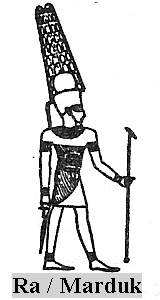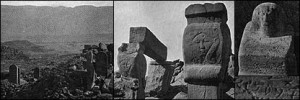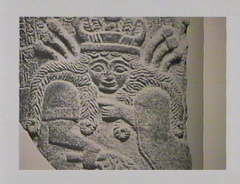Published: Léfébure, Tombeau de Sety Ie, pt. iii, pls. 15-18 (Annales du Musée Guimet, ix).
Translated: Wiedemann, Religion of the Ancient Egyptians, p. 62. (For a description of the tomb of Sety I see the Notes on Legend xi).
(Texts: All Artifacts, Color Coding, & Writings in Bold Type With Italics Inside Parenthesis, are Added by Editor R. Brown, not the Authors, Translators, or Publishers!)
(gods in blue)
This story is sculptured on the walls of a side-chamber off one of the inner halls of the tomb of Sety I (room xii of the guide-books). On one of the walls is a representation of a cow standing under the star-sprinkled vault of heaven
This is Nut, the sky-goddess; she is raised on the uplifted hands of the god Shu, and each leg is supported by two gods; planets, and Boats of the Sun travel across her body. The connection between this representation and the legend is quite uncertain.
The tale occurs only in this one place, but every excavator hopes that he may one day find a tomb with a complete copy of the story sculptured on the walls.
Now the Majesty of Ra (Marduk) reigned over the Two Lands.
He was the second king of Egypt, and in his reign peace was on earth,
and harvests were so plentiful that to this day men speak of the good things
which “happened in the time of Ra.”
By his own power he created himself, and he created heaven and earth,
gods and men, and he ruled over them all.
For hundreds and hundreds of years he ruled until he waxed old,
and men no longer feared him, but laughed and said,
“Look at Ra! He is old, his bones are like silver, his flesh like gold,
and his hair like true lapis lazuli (blue-hued gem stone).”
Then Ra was wroth when he heard their jests and their laughter,
and he called to those who were in his train,
“Summon hither my daughter, the apple of my eye,
and summon also the gods Shu and Tefnut, Geb and Nut,
and the great god Nun, whose dwelling is in the waters of the sky.
Do my bidding secretly lest men shouldhear you and see you,
for then would they be afraid and hide themselves.”
In secret went the messengers,
very softly they came to summon the gods and goddesses.
Secretly and softly came the gods and goddesses
to the Mansion of Ra in the Hidden Place.
Naught did men see or hear; and they laughed again at Ra,
not knowing the punishment that should fall upon them.
On each side of the throne came the gods and goddesses,
and they bowed before the Majesty of Ra with their foreheads to the ground,
saying, “Speak that we may hear.”
Then said Ra to Nun, the great god whose dwelling is in the waters of the sky,
“O eldest of the gods and all ye ancestor-gods!
Behold the men whom I have created, how they speak against me.
Tell me what ye would that I should do to them,
for verily I will not slay them till I have heard your words.”
And Nun, the great god whose dwelling is in the waters of the sky, made answer,
“My son Ra, greatest of gods, mightiest of kings, thy throne is set fast,
and thy fear will be upon all the world when thou sendest out thy daughter,
the apple of thine eye, against those who attack thee.”
The Majesty of Ra spoke again,
“Lo, they will flee to the deserts and the mountains and hide themselves,
if fear falls upon their heartson account of their jests and laughter;
and in the deserts and mountains none can find them.”
Then said the gods and goddesses,
bowing before him with their foreheads on the ground,
“Send forth thy daughter, the apple of thine eye, against them.”
And at once there came the daughter of Ra.
Sekhmet is she called, and Hathor (Ninhursag), fiercest of the goddesses;
like a lion she rushes on her prey, slaughter is her delight,
and her pleasure is in blood.
At her father’s bidding she entered the Two Lands to slay those
who had rebelled against the Majesty of Ra,
and had turned their rebellion to jest and laughter.
In the land of Ta-mery she killed them, and on the mountains
which lie to the east and west of the great river.
To and fro she hastened, slaying all who crossed her path,
and before her fled the rebels against Ra.
And Ra looked forth upon the earth and cried to his daughter,
the apple of his eye, “Come in peace, O Hathor (Ninhursag)!
Hast thou done that which I gave thee to do?”
And Hathor laughed as she answered,
and her laugh was the terrible voice of the lioness as she tears her prey.
“By thy life, O Ra,” she cried, “I work my will upon men, and my heart rejoices.”
For many nights the river ran red, and the goddess waded in the blood of men,
and her feetwere red as she strode through the land of Egypt as far as Henen-seten.
Then Ra looked forth upon the earth again,
and his heart was filled with pity for men, though they had rebelled against him.
But none could stop the ruthless goddess, not even the Majesty of Ra himself;
of herself must she cease to slay, for neither gods nor men could compel her.
By subtlety alone could this be accomplished.
Ra gave command, saying,
“Call hither to me messengers who are swift as the blast of the storm wind.”
And when they were brought, he said,
“Run to Elephantine, hasten, go quickly,
and bring back to me the fruit that causes sleep.
Be swift, be swift, for all this must be accomplished ere the day dawn.”
The messengers hastened,
and their speed was the speed of a blast of the storm-wind.
They came to Elephantine,
where the great river rages among the rocks that bar its passage;
they took the fruit that causes sleep,
and with the fleetness of the wind they brought it to Ra.
Crimson and scarlet was the fruit, and its juice was the color of man’s blood;
and the messengers carried to it Heliopolis, the city of Ra.
Then the women of Heliopolis crushed barley and made beer,
and with the beer they mixed the juice of the fruit that causes sleep,
and the beer became the color of blood.
Seven thousand measures of beer did they make,
and in hastethey brewed it, for the night was drawing to a close
and the day was about to break.
In haste came the Majesty of Ra, and all the gods and goddesses,
who were with him, to Heliopolis to inspect the beer.
Ra saw that it was like human blood, and he said,
“Very good is this beer. By this I can protect mankind.”
At the dawning of the day, he gave command,
“Carry this beer to the place where men and women have been slain,
and pour it out upon the fields before the beauty of the night has passed.”
So they poured it out upon the fields.
Four palms deep it lay upon the ground, and its color was the color of blood.
In the morning came the fierce Sekhmet, ready to slay,
and as she passed by she looked to this side and that, watching for her prey.
But no living thing did she see,
only the fields that lay four palms deep in the beer that was the color of blood.
Then she laughed with the laugh like the roar of a lioness,
for she thought it was the blood she had shed. And she stooped and drank.
Again and again she drank, and she laughed the more,
for the juice of the fruit that causes sleep mounted to her brain,
and no longer could she see to slay by reason of the juice of that fruit.
Then the Majesty of Ra said to her, “Come in peace, O sweet one.”
And to this day the maidens of Amu are called “Sweet Ones ” in remembrance.
And the Majesty of Ra spoke again to the goddess, saying,
“For thee shall be prepared drinks from the fruits that cause sleep;
every year shall these be made at the great Festival of the New Year,
and the number of them shall be according
to the number of the priestesses who serve me.”
And to this day, on the festival of Hathor (Ninhursag),
drinks are made of the fruits that cause sleep,
according to the number of the priestesses of Ra,
in remembrance of the protection of mankind from the fury of the goddess.



